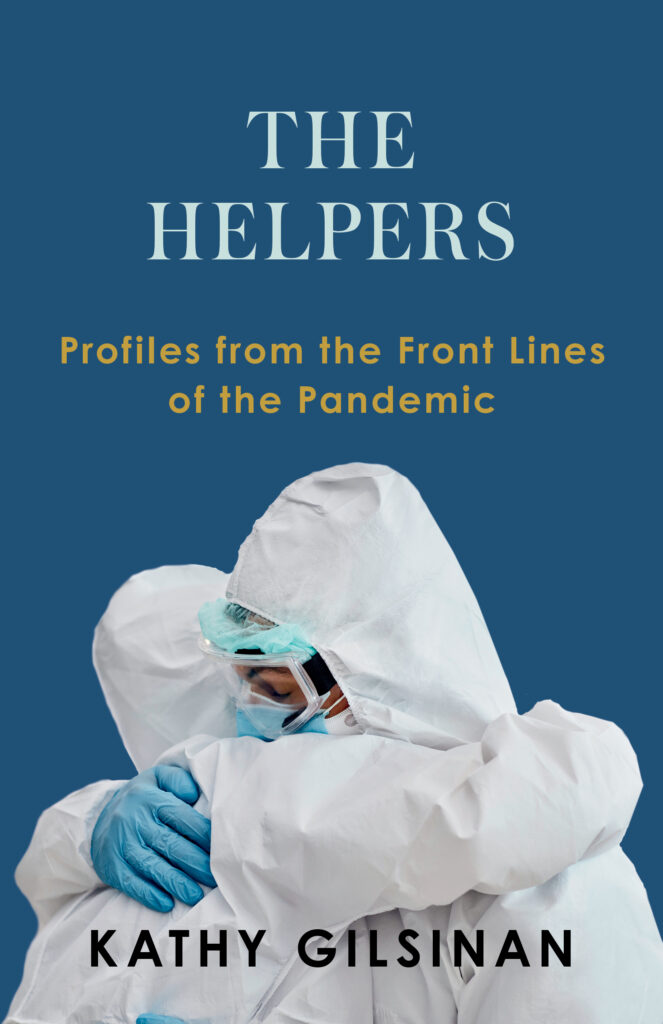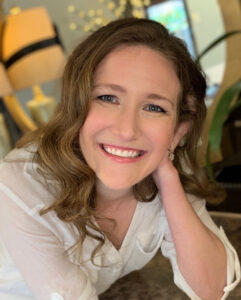
That tangled bouquet of masks I kept hooked over the indicator light in my car? Shoved into the glove compartment. The shared calendar on a wall in the kitchen? Filling up. We made it through these weird years, and the last thing I want to think about this spring is the pandemic.
Except there is this book. The Helpers: Profiles from the Front Lines of the Pandemic. And it is written by Kathy Gilsinan, and I know her and like her work. A lot. I followed her writing at The Atlantic, and when she came home to St. Louis, I was eager to see what she would do next.
With a resigned sigh, I pick up the book. The title strikes dread: such a book could easily be schmaltzy, or melodramatic, or formulaic. Instead, it proves incisive and insightful—and for me, therapeutic. As I read, months of rage and bitter disappointment soften, and my early awe at Americans’ brave altruism returns.
I have missed that feeling. I am so tired of being angry.
My cynicism does not dissolve all at once, or completely. One of the epigraphs is a quote from The Plague, in which Albert Camus sets out “to state plainly what we learn in times of pestilence: that there are more things to admire in men than to despise.” In the margin, I jot, “But are there?” What about the people who told kids to rip off their masks? Who circulated information so wrong, it was lethal? Who made elderly and vulnerable people too scared to get the vaccine and thus killed many of them, too?
I read the first chapter, and it feels like she found my pandemic journal and erased the furious, incoherent scribbles, cleaning the page and letting me see a different picture. That image glowed in the earliest days of the pandemic, when we were scared but grateful, reaching out, awed by the courage at the front line. Then, for me, those helpers moved offstage. They continued to work, and I knew they were back there, and I was grateful—but I was consumed with anger at the people who were making their jobs so much harder and so unnecessarily dangerous.
“The truth was that most Americans reported practicing social distancing and wearing masks to leave the house, making millions of difficult, boring, unglamorous decisions to protect their neighbors,” Gilsinan reminds me. “The truth is that most people behaved honorably.”
She is not sucking lollipops in the sunshine; she is well aware of the scope of the disaster. “Ten million net jobs lost by the end of the year, tens of thousands of bankruptcies, entire people-facing industries such as restaurants devastated, record drug overdose deaths.” She also notes that “there will be other books written on the many ways we failed these individuals and each other, about the bungled government response, about how the arc of American public life bent from goodwill toward dysfunction.” But she wanted to study human nature at its best, at a time when it was put to the test.

Author Kathy Gilsinon
The Helpers is a great read, as hard to put down as any thriller. I want to know what will happen to the family the book opens with—I am scared for the mom, but I also suspect the dutiful son might get sick, and what about his baby nieces and nephews? Watching the young woman at Moderna push her colleagues to try for a vaccine—and realizing what a small, fledgling, unproven company that was—is exciting. So is the partnership the owner of the ventilator company rigs with GM, scaling up to give breath to thousands more people. The nurse—how will she hold it together? The paramedic in his sixties—is his heroism saintly or compulsive, and is there a difference?
Gilsinan has asked questions most reporters do not think to bother with, gathering up tiny details and using the most telling to bring these people to life. You feel you know them, not just casually but the way you know longtime coworkers or neighbors. You care about them, with a warmth hard for books like this to achieve.
These lives also remind me, in already surreal flashbacks, of a time when we were still learning what PPE meant, what “fomites” were. Of my favorite meme: “Your grandparents were called to war. You’re being called to sit on your couch. You can do this.” Of the exponential math, turning 15 confirmed cases to 1,000 in less than a month; racking up a million new cases in three months and then in only ten days. Gilsinan finds a better slant than panic: “Nothing underscores human interconnectedness quite like contagion.” She has mastered wry optimism
She also knows how to render the complex simple. There are fresh, vivid explanations of how our lungs work, what Covid could do to them, how an mRNA vaccine works, what intubation does. Now I understand? After months of rereading dense explanations that did not stick?
From biology, she turns to politics, tracing how “the new, spikey little pathogen—measuring perhaps a thousandth the width of a human hair—became the puppeteer of multibillion-dollar companies much more accustomed to shaping the world themselves.” She does not stop with the corporations, though: “That the force took the form of an invisible nanoparticle, wantonly smashing human lives and human plans, was a crueler mockery of our illusions about our own power.”
Real power lies elsewhere. Gilsinan set out to understand what animated people’s sacrifices, their superhuman efforts to stop the virus and heal the sick. She admits being a little disappointed by the simplicity of what she learned: mainly, what drove those who helped forward was good old-fashioned stubbornness. In a crisis, we look for magic solutions, heroic traits borrowed from Mount Olympus. We forget that all we need is grit.
Read more by Jeannette Cooperman here.
